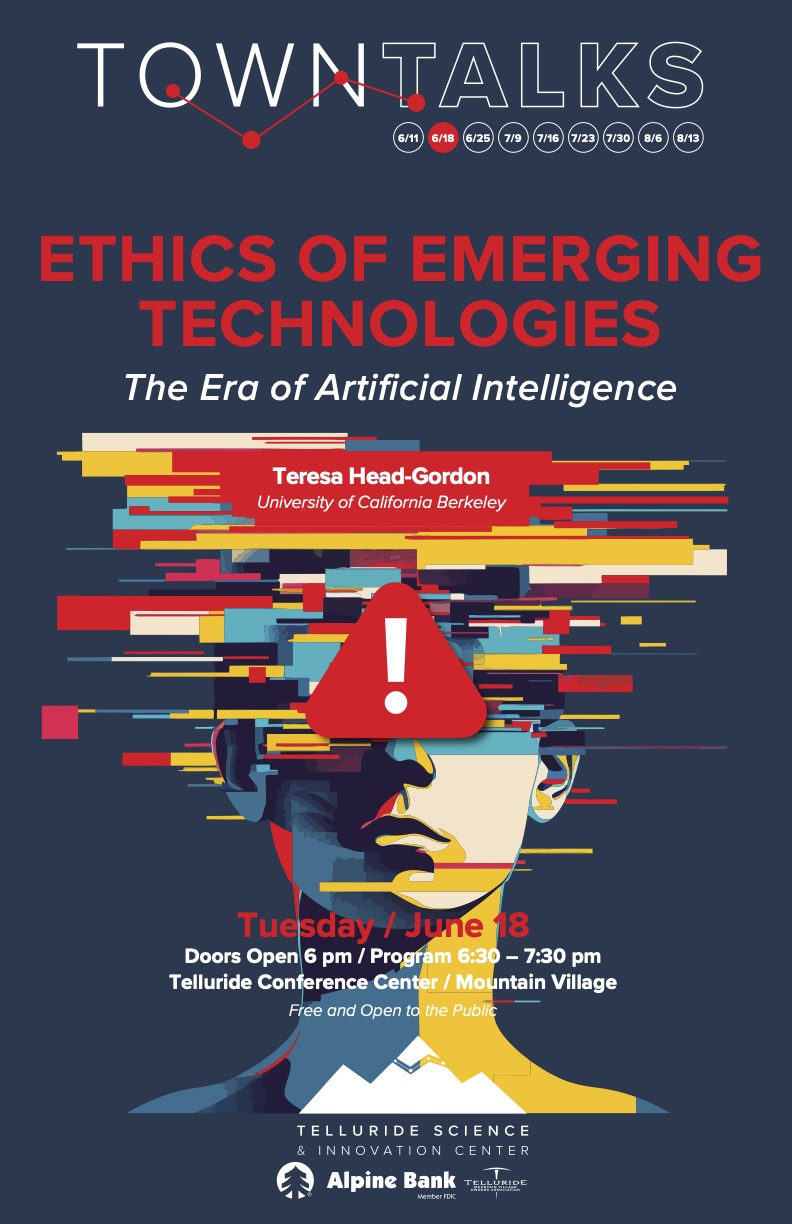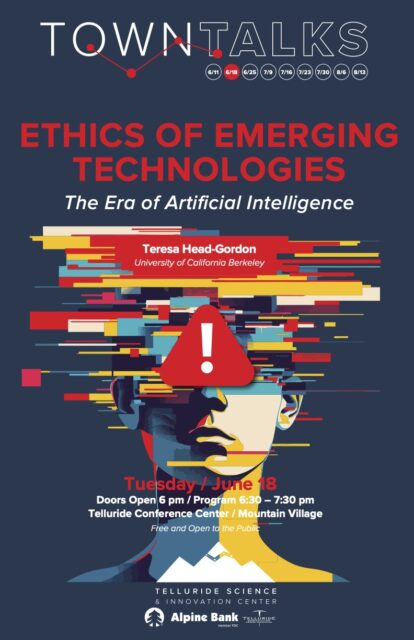
17 Jun Telluride Science Town Talk: “Ethics of Emerging Technologies – The Era of Artificial Intelligence,” 6/18!
This coming week the 2024 Telluride Science Town Talks series continues with Dr. Teresa Head-Gordon. Her subject, “Ethics of Emerging Technologies: The Era of Artificial Intelligence.” The event takes place Tuesday, June 18, 6:30 pm, doors, 6 p.m., at the Telluride Conference Center in Mountain Village. Town Talks are FREE and open to the public.
Note: Telluride Science is committed to expanding its public outreach programming. This summer, Telluride Science is hosting the greatest number of Town Talks the nonprofit has held to date, a total of nine. All Town Talks are to be held at the Telluride Conference Center. Mountain Village.
Visit telluridescience.org to learn more about Telluride Science and the capital campaign to transform the historic Telluride Depot into the Telluride Science & Innovation Center. The venue is soon to be a permanent home for Telluride Science and a global hub of inspired knowledge exchange and development where great minds get to solve great challenges.
The 2024 Telluride Science Town Talks series is being presented by Alpine Bank with additional support from the Telluride Mountain Village Owner’s Association.
Go here for more about Telluride Science.
Go here for more on Town Talks.

This coming week the 2024 Telluride Science Town Talks hosts its second speaker, Dr. Teresa Head-Gordon. Her subject: “Ethics of Emerging Technologies: The Era of Artificial Intelligence.” The event takes place Tuesday, June 16, 6:30 p.m. (doors, 6 p.m.) at the Telluride Conference Center.
The Atlantic nailed it in a recent article titled “This Is What It Looks Like When AI Eats the World” when it said “The web itself is being thrown into the great unknown.”
And within that unknown lies the ethical implications of this quicksilver technology.
Before going too far down that road, it is important to have at least an elementary understanding of what Artificial Intelligence (AI) is all about. Online sources simply define AI as “a machine’s ability to perform the cognitive functions we associate with human minds,” such as learning, reasoning and creativity.
And the ethical implications?
Advocates tout the technology’s potential to supercharge productivity, creating a new era of better jobs, better education and better treatments for diseases.
Skeptics have raised concerns about the technology’s potential to disrupt jobs, mislead and possibly bring about the end of humanity as we know it. They say advocates are sugarcoating a variation on the theme of the apocalypse.
And Silicon Valley execs? They and others in the tech space seem to hold both sets of views at once.
Forbes tackled questions surrounding ethics and AI in an article published last January. The story laid out what experts think are the five major concerns of the burgeoning technology:
• Data Bias
• Accountability
• Privacy
• Job Displacement
• Transparency
The subtext to that list of major socio-cultural concerns boils down to one simple, albeit elusive, fact: If the above are addressed properly there will sound ways to implement AI…
If…
That said, one of these ethical concerns is already generating major controversy: transparency.
In the context of AI, transparency basically means all stakeholders require a clear understanding of how the system works – as well as the motives of those pushing its use.
Developers claim to be dedicated to following sound (read ethical) practices and ensuring measures to maintain safe use, but when dollars get involved , all bets are off.
How big is big dollars? According to online statistics sites, the AI market already has a value of around $241 billion USD, but is expected to grow rapidly to nearly $750 billion USD by 2030.
With that much money at stake, ethics could fall by the wayside.
Thankfully, however, there are people like Dr. Teresa Head-Gordon dedicated to finding safe, principled ways to use AI.

Dr. Teresa Head-Gordon, courtesy Telluride Science.
Head-Gordon is a professor at UC Berkeley who holds a BS in Chemistry and a PH.D. in Theoretical Chemistry.
Head-Gordon, has been involved in the study of machine learning from its early days in the 1990’s. She has also been teaching a course titled “The Ethics of Emerging Technologies,” since 2007,. That class became a requirement at Berkley for all bioengineers, data science majors, even for the master’s program in molecular sciences and software engineering.
In her research Head-Gordon has focused on two major concerns regarding AI and Machine Learning in general.
Deep fakes are pieces of media, usually videos, but sometimes audio recordings, created to show a person saying or doing something that never actually happened. Those fakes are already in use to smear politicians, celebrities, and other public figures, but may soon be used to spread even more mis- or disinformation, with, shall we say, interesting ramifications for the 2024 election cycle.
Head-Gordon’s other major concern involves the motivations of industry with regard to profit, very much related to the $241-billion price tag mentioned above.
Will it be a race to the bottom to capture the bucks and market share? Will AI actually “eat the world” as The Atlantic suggests it might?
In other words, will AI generate more dollars than sense.
Dr. Head-Gordon will answers some of these questions in her Telluride Science talk.
Be there or at least be aware.


Sorry, the comment form is closed at this time.